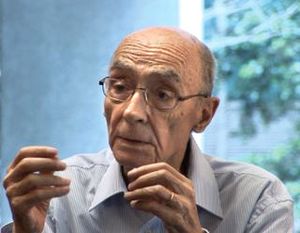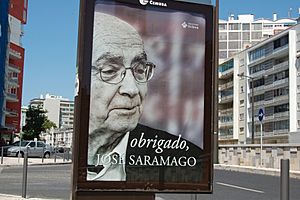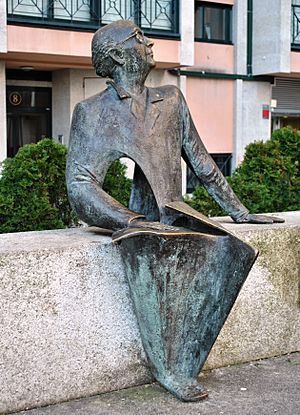José Saramago facts for kids
Quick facts for kids
José Saramago
|
|
|---|---|

Saramago in January 2008
|
|
| Born | José de Sousa Saramago 16 November 1922 Azinhaga, Santarém, Portugal |
| Died | 18 June 2010 (aged 87) Tías, Lanzarote, Spain |
| Occupation | Writer |
| Nationality | Portuguese |
| Period | 1947 – 2010 |
| Notable works |
The Gospel According
Baltasar and Blimundato Jesus Christ Blindness All the Names Death with Interruptions The Double The Year of the Death of Ricardo Reis |
| Notable awards | Camões Prize (1995) Nobel Prize in Literature (1998) |
| Spouse | Pilar del Río (1988-2010) Ilda Reis (1944-1970) |
| Signature | |
 |
|
José de Sousa Saramago (born November 16, 1922 – died June 18, 2010) was a famous Portuguese writer. He won the Nobel Prize in Literature in 1998, which is one of the highest awards for writers.
Many people loved his books. More than two million copies were sold in Portugal alone. His stories have been translated into 25 different languages around the world.
Saramago believed in libertarian communism, which is a way of thinking about society where people are very free and work together. He often spoke out against big organizations like the Catholic Church and the European Union.
He was also an atheist, meaning he did not believe in God. He thought that love was the best way to make the world a better place for everyone. In 1992, the government of Portugal tried to stop his book The Gospel According to Jesus Christ from winning an award. They said it was offensive to religion. Saramago was very upset by this censorship (when someone tries to stop you from saying or writing something). Because of this, he moved to the Spanish island of Lanzarote and lived there until he passed away.
José Saramago helped start important groups. He was a founding member of the National Front for the Defense of Culture in Lisbon. He also co-founded the European Writers' Parliament (EWP) with another famous writer, Orhan Pamuk.
Contents
José Saramago's Early Life and Career
José Saramago was born in a small village called Azinhaga in Portugal. His family were farmers who did not own land. This was about 100 kilometers (60 miles) north-east of Lisbon.
After finishing school, he worked as a car mechanic for two years. Then, he became a translator, helping to change books and texts from one language to another. Later, he worked as a journalist, writing for newspapers. He was even an assistant editor at a newspaper called Diário de Notícias.
In 1974, there was a big change in Portugal called the Carnation Revolution, which brought democracy to the country. After this, Saramago had to leave his job at the newspaper. For a while, he continued working as a translator. Eventually, he was able to earn enough money to become a full-time writer.
Family Life and Unique Writing Style
Saramago married Ilda Reis in 1944. They had one daughter, who was born in 1947. Later, in 1986, he met a Spanish journalist named Pilar del Río. They got married in 1988 and stayed together until he died. Pilar del Río is also the person who translates his books into Spanish.
José Saramago became famous around the world when he was in his mid-fifties. His novel Baltasar and Blimunda helped him gain many readers internationally. This book also won the Portuguese PEN Club Award.
He was a member of the Portuguese Communist Party from 1969 until his death. He was also an atheist and sometimes called himself a pessimist. His ideas often caused discussions in Portugal, especially after his book The Gospel According to Jesus Christ was published.
Saramago's books often use amazing and unusual ideas. For example, in his 1986 novel, The Stone Raft, the Iberian Peninsula (where Spain and Portugal are) breaks away from Europe and floats around the Atlantic Ocean. In his 1995 novel, Blindness, a whole country is affected by a strange illness that makes everyone go blind.
José Saramago's Death and Lasting Impact
José Saramago had leukemia, a type of cancer. He passed away on June 18, 2010, at the age of 87. He had spent the last few years of his life living in Lanzarote, Spain.
Many people recognized his importance. The Guardian newspaper called him "the finest Portuguese writer of his generation." Portugal declared two days of national mourning after his death. Many important international leaders sent their condolences.

Saramago's funeral was held in Lisbon on June 20, 2010. More than 20,000 people came to say goodbye, with many traveling long distances. His body was cremated in Lisbon. His ashes were buried a year later, on June 18, 2011. They rest under a very old olive tree in front of the José Saramago Foundation building.
The José Saramago Foundation was started by José Saramago himself in 2007. Its main goals are to protect and spread the ideas of the Universal Declaration of Human Rights. It also works to promote culture in Portugal and other countries. Another important goal is to help protect the environment. The Foundation is located in a historic building in Lisbon called the Casa dos Bicos.
Awards and Accolades
José Saramago received many important awards for his writing:
- 1995: Camões Prize
- 1998: Nobel Prize in Literature
- 2004: America Award
- 2009: São Paulo Prize for Literature — He was a finalist for Best Book of the Year for A Viagem do Elefante (The Elephant's Journey).
Images for kids
-
Saramago at Teatro Jorge Eliécer Gaitán in Bogotá in 2007
See also
 In Spanish: José Saramago para niños
In Spanish: José Saramago para niños





